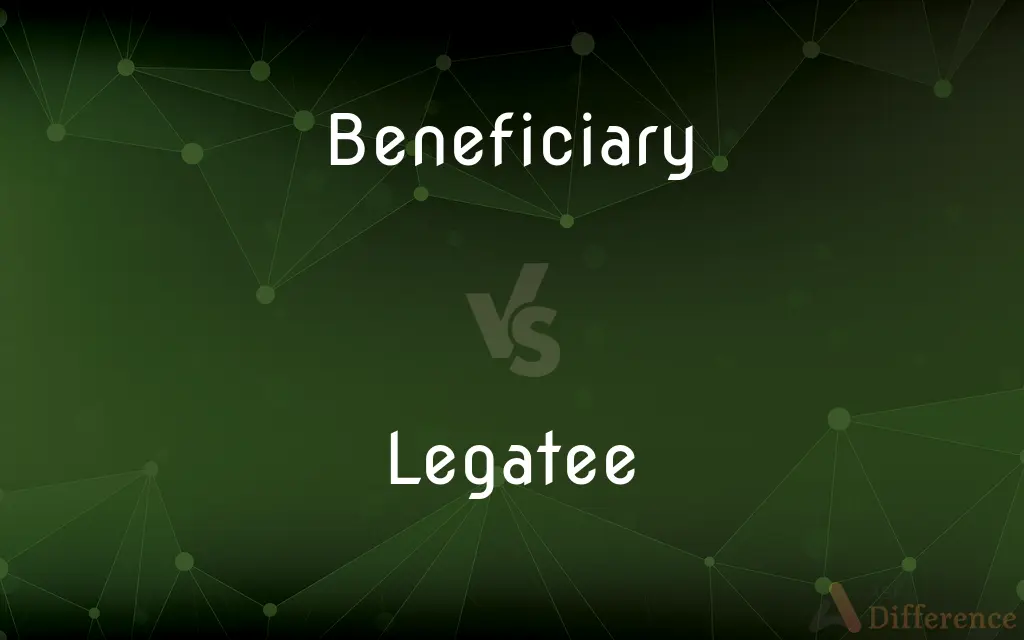Beneficiary vs. Legatee — What's the Difference?
By Tayyaba Rehman & Urooj Arif — Updated on March 11, 2024
A beneficiary is someone designated to receive benefits or assets from a will, trust, or insurance policy, while a legatee specifically inherits personal property through a will.

Difference Between Beneficiary and Legatee
Table of Contents
ADVERTISEMENT
Key Differences
Beneficiaries can be named in various legal and financial contexts, including wills, trusts, insurance policies, and retirement accounts, where they are designated to receive assets or benefits. On the other hand, a legatee is a type of beneficiary who specifically inherits personal property through a will, such as jewelry, cars, or other non-real estate items.
While beneficiaries encompass a broad category of individuals or entities that may receive assets or benefits upon the death of another, legatees are confined to the realm of wills and testamentary gifts. Legacies typically refer to the distribution of personal property, whereas beneficiaries might also inherit real property, financial assets, or be named in instruments outside of wills.
The role of a beneficiary is crucial in estate planning and the distribution of assets, ensuring that the deceased's wishes are honored and assets are passed on to the intended parties. Legatees, while a subset of beneficiaries, play a significant role in the specific bequests made in a will, often receiving items of sentimental or monetary value designated by the testator.
Beneficiaries might need to navigate various legal processes, including probate or trust administration, depending on the nature of the assets and the instruments in which they are named. Conversely, legatees’ entitlements are typically resolved through the probate process, where the will is validated, and the personal property is distributed according to the testator's wishes.
Despite the specific legal distinctions, the terms are sometimes used interchangeably in common language. However, understanding the nuances can provide clarity in estate planning and legal discussions, ensuring that assets are distributed as intended.
ADVERTISEMENT
Comparison Chart
Definition
Individual/entity designated to receive assets or benefits from various instruments.
Individual named in a will to inherit personal property.
Contexts
Wills, trusts, insurance policies, retirement accounts.
Specifically within the context of wills.
Types of Assets
Broad range, including real and personal property, financial assets.
Primarily personal property, such as jewelry, cars, etc.
Legal Process
May involve probate, trust administration, or other processes.
Generally resolved through the probate process.
Scope
Encompasses a wider range of instruments and asset types.
Limited to personal property bequests in wills.
Compare with Definitions
Beneficiary
Insurance.
The policyholder designated his spouse as the primary beneficiary of his life insurance.
Legatee
Heirlooms.
Family heirlooms were passed down to designated legatees in the will.
Beneficiary
Trusts.
The family trust was established with his grandchildren as beneficiaries.
Legatee
Artwork.
A close friend was the legatee for the artist's paintings.
Beneficiary
Retirement Accounts.
Her 401(k) plan listed her siblings as beneficiaries.
Legatee
Memorabilia.
The will declared his nephew the legatee of his sports memorabilia collection.
Beneficiary
Wills.
The will stipulated that a portion of his estate would go to charity as a beneficiary.
Legatee
Jewelry.
Her niece was named as the legatee for her collection of antique jewelry.
Beneficiary
Estate Planning.
She named her children as beneficiaries in her trust.
Legatee
Personal Property.
The legatee inherited a vintage car as specified in the will.
Beneficiary
One that receives a benefit
I am the beneficiary of your generosity.
Legatee
A legatee, in the law of wills, is any individual or organization bequeathed any portion of a testator's estate.
Beneficiary
The recipient of funds, property, or other benefits, as from an insurance policy or trust.
Legatee
The inheritor of a legacy.
Beneficiary
(Ecclesiastical) The holder of a benefice.
Legatee
(legal) One who receives a legacy.
Beneficiary
One who benefits or receives an advantage.
You are the lucky beneficiary of this special offer.
Legatee
One to whom a legacy is bequeathed.
Beneficiary
(legal) One who benefits from the distribution, especially out of a trust or estate.
If any beneficiary does not survive the Settlor for a period of 30 days then the Trustee shall distribute that beneficiary’s share to the surviving beneficiaries by right of representation.
Legatee
Someone to whom a legacy is bequeathed
Beneficiary
(insurance) One who benefits from the payout of an insurance policy.
Beneficiary
Holding some office or valuable possession, in subordination to another; holding under a feudal or other superior; having a dependent and secondary possession.
Beneficiary
Bestowed as a gratuity.
Beneficiary gifts
Beneficiary
Holding some office or valuable possession, in subordination to another; holding under a feudal or other superior; having a dependent and secondary possession.
A feudatory or beneficiary king of England.
Beneficiary
Bestowed as a gratuity; as, beneficiary gifts.
Beneficiary
A feudatory or vassal; hence, one who holds a benefice and uses its proceeds.
Beneficiary
One who receives anything as a gift; one who receives a benefit or advantage; esp. one who receives help or income from an educational fund or a trust estate.
The rich men will be offering sacrifice to their Deity whose beneficiaries they are.
Beneficiary
The recipient of funds or other benefits
Beneficiary
The semantic role of the intended recipient who benefits from the happening denoted by the verb in the clause
Beneficiary
Having or arising from a benefice;
A beneficiary baron
Common Curiosities
Is a legatee the same as a beneficiary?
A legatee is a type of beneficiary specifically related to wills and the inheritance of personal property.
How are beneficiaries named?
Beneficiaries are named in legal documents like wills, trusts, insurance policies, and retirement accounts.
Can a beneficiary inherit real estate?
Yes, beneficiaries can inherit a broad range of assets, including real estate, depending on the context in which they are named.
Can someone be both a beneficiary and a legatee?
Yes, an individual can be named as both a beneficiary and a legatee, receiving different assets through various instruments.
What types of assets can a legatee inherit?
Legatees typically inherit personal property, which includes items like jewelry, cars, and artwork.
What is a legatee?
A legatee is a person named in a will to inherit personal property, such as jewelry, artwork, or cars.
What is the legal process for beneficiaries?
The process can involve probate, trust administration, or the terms of an insurance policy or retirement account, depending on where the beneficiary is named.
How is a legatee different from an heir?
A legatee is named in a will to receive specific property, while an heir is a legal successor who inherits based on familial relationship if there's no will.
What is a beneficiary?
A beneficiary is an individual or entity designated to receive assets or benefits from a will, trust, insurance policy, or retirement account.
Can charities be beneficiaries?
Yes, charities can be named as beneficiaries in wills, trusts, and other financial instruments.
Do all beneficiaries have to go through probate?
Not all assets distributed to beneficiaries require probate; it depends on the asset and how it's held or titled.
What happens if a beneficiary predeceases the testator?
The disposition of the assets depends on the terms of the will, trust, or other legal instruments, which may include alternate beneficiaries.
Are legacies always monetary?
No, legacies often involve personal property, which can have sentimental or monetary value but are not limited to cash.
Can a will have multiple legatees?
Yes, a will can designate multiple legatees, each inheriting specific items of personal property as dictated by the testator.
What is a residual legatee?
A residual legatee inherits the remainder of the estate after all debts, taxes, expenses, and specific bequests have been paid.
Share Your Discovery

Previous Comparison
Submissive vs. Respect
Next Comparison
Evaluation vs. ConclusionAuthor Spotlight
Written by
Tayyaba RehmanTayyaba Rehman is a distinguished writer, currently serving as a primary contributor to askdifference.com. As a researcher in semantics and etymology, Tayyaba's passion for the complexity of languages and their distinctions has found a perfect home on the platform. Tayyaba delves into the intricacies of language, distinguishing between commonly confused words and phrases, thereby providing clarity for readers worldwide.
Co-written by
Urooj ArifUrooj is a skilled content writer at Ask Difference, known for her exceptional ability to simplify complex topics into engaging and informative content. With a passion for research and a flair for clear, concise writing, she consistently delivers articles that resonate with our diverse audience.














































